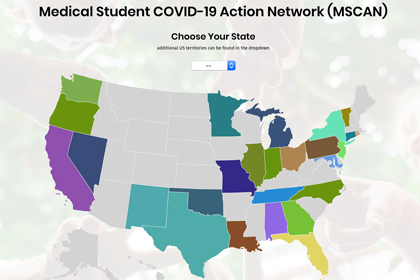On March 13, amidst the COVID-19 pandemic, Vinh Le walked out of the University of Vermont’s Larner College of Medicine, uncertain about when he and his classmates would be returning. Two weeks later, Le’s Medical Student COVID-19 Action Network (MSCAN) emerged as a map of how medical students across the nation have met that challenge posed by the pandemic.

The Medical Student COVID-19 Action Network website provides an interactive map to explore volunteer opportunities for medical students across the country
The "COVID-19: The Larner Community Responds" series highlights stories about Larner College of Medicine students, faculty and staff who are answering the call for help during the COVID-19 pandemic.
On March 13, amidst the COVID-19 pandemic, Vinh Le walked out of the University of Vermont’s Larner College of Medicine, uncertain about when he and his classmates would be returning. A week later, as he grew used to the new rhythm of remote classes, the palpably tense mood of that moment still haunted him.
His classmates’ doubt and sadness stood in stark contrast to the excitement and passion to serve that he had become accustomed to experiencing. “I didn’t want to see the COVID-19 pandemic take that spirit away,” says Le. “If anything, we should be inspired – we are being given a chance to rise up to meet a challenge. We need to take it.”
Two weeks later, Le’s Medical Student COVID-19 Action Network (MSCAN) emerged as a literal map of how medical students across the nation have met that challenge.
Le wasn’t the only one in his class pondering what to do; Cyrus Thomas-Walker ’23 was, too. They both were hearing about classmates and friends at medical schools around the country who were spearheading individual volunteer initiatives, often with similar focuses, such as personal protective equipment (PPE) donation drives, childcare assistance, COVID information hotlines, and blood drives. Yet, with no way to centralize the projects, schools were unable to borrow ideas, support each other, combine resources, and reach students who had been displaced from their home institutions.
“In the fog of a crisis, everything can get disorganized so quickly,” Thomas-Walker explains. After an hour’s discussion, the two had identified a solution: develop on online searchable database for all medical student-organized COVID-19-related service opportunities across the country.
Le, who had dabbled in web development since high school, immediately reached out to his friend, software developer, and Silicon Hills LLC cofounder, Jam Risser. Twenty-four hours later, Risser had erected MSCAN’s basic framework and Le and Thomas-Walker set out to enlist more help to populate the database.
Twenty-two of Le and Thomas-Walker's Larner College of Medicine classmates joined the effort to develop a list of contacts at each of the 143 accredited U.S. medical schools and gather volunteer data from them. To streamline the process, each team member was assigned six schools to cover, and to make it easier for partner schools to send information, Lauren Okamoto ’23 created a basic online form that takes mere minutes to complete. At first, the data trickled in; now it’s become a flood.
Le says that as other schools learned about their project, they began to ask about other ways they could join the effort. He values the relationships they’ve developed along the way, in particular, with University of Minnesota Medical School medical students Sara Lederman '22 and Angelina Omodt-Lopez '21. Lederman and classmate Sruthi Shankar ’22 recently launched a volunteer database called
MN COVIDSitters, designed to connect medical students with frontline healthcare workers seeking childcare. Not only were they interested in having their initiative included in MSCAN’s database, they wanted to promote the database throughout their network. Now, with the help of Omodt-Lopez, MSCAN is listed as primary resource for medical students in national organization
WhileAtHome’s Frontline Family resources.
Currently, MSCAN includes over 250 volunteer activities, spanning 50 medical schools in 26 states*, with more being added every day. Le is continuing to seek out and nurture collaborations with medical schools and organizations that have had similar ideas, such as Harvard Medical School and Public Health Awakened. Thomas-Walker says MSCAN’s next step is to reach out to all United States osteopathic schools.
To his fellow medical and healthcare students, Le says, "This is so much bigger than us. We could just be sitting around - doing a ton of schoolwork, studying for the boards – but we’re called to go beyond that. I hope our initiative will help everyone more easily find a way to do that.”
To view COVID-19-related medical student volunteer initiatives around the U.S. visit MSCAN at
http://mscanvolunteer.org.
If you’re a medical student who knows of volunteer efforts being organized at your school, visit MSCAN's get involved page at
https://publichealthcoalition.org/#get-involved.
UVM Larner College of Medicine medical students involved in the development and maintenance of MSCAN are:
Vinh Le
Agatha Forstein
Alex Jenkins
Alexa Rosenthall
Amberly Lao
Andrew DesLauriers
Annabelle Davey
Brad Fiske
Brittany Gilmore
Cyrus Thomas-Walker (Strategy and PR)
Jessica Lyon
Kyle Kellett
Lauren Okamoto
Lud Eyasu
Micaila Baroffio
Naomi Koliba
Niv Badrinarayanan
Ray Mak
Sam Aldous
Samantha Schuetz
Sydney Chatfield
Willie Dong
Ashta Narain
Lucy Merriam
Nikkole Turgeon
Charlotte Gemes
Caitlin Dowling
* As of May 1, 2020, the MSCAN database contains over 530 activities from 104+ schools in 40 states. There are currently 57 team members and 240 additional contributors. The team has also started a video initiative. Faculty sponsors for the video initiative are Drs. Louis Polish and Tim Lahey, who are guiding the general direction of that project and helping ensure that any information presented is up-to-date and accurate.